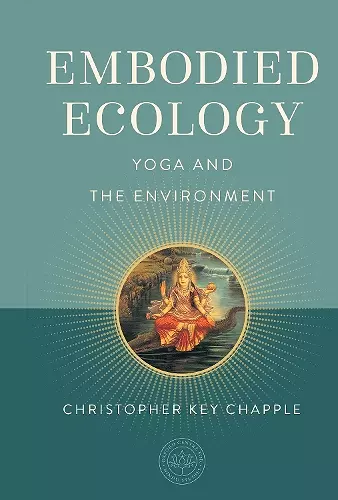Embodied Ecology
Yoga and the Environment
Christopher Key Chapple author The Oxford Centre for Hindu Studies editor
Format:Hardback
Publisher:Insight Editions
Publishing:8th May '25
£22.99
This title is due to be published on 8th May, and will be despatched as soon as possible.

OXFORD CENTRE SERIES: Embodied Ecology joins The Oxford Centre for Hindu Studies Mandala Publishing Series. This book joins other accessible texts on Hinduism authored by expert scholars, including The Bhagavad Gita: A New Translation and Study Guide; The Hindu Temple and Its Sacred Landscape; and Women in the Hindu World. EXPERT AUTHOR: Christopher Key Chapple is Doshi Professor of Indic and Comparative Theology and founding director of the Master of Arts in Yoga Studies at Loyola Marymount University. He has authored more than twenty books and serves on the advisory boards for the Forum on Religion and Ecology (Yale), the Ahimsa Center (Pomona), the Jaina Studies Centre (London), the Dharma Academy of North America (Berkeley), the Uberoi Foundation (Denver), the South Asian Studies Association (Los Angeles), and the International School for Jain Studies (Delhi). EDUCATION AID: This text serves as a comprehensive resource for both classwork and independent study of Hinduism. With the integration of discussion questions, suggested further reading, and images throughout, Embodied Ecology offers an accessible introduction to the study of Hinduism. ONLINE COURSES: The titles included in this series will be the official publications accompanying online courses offered by the Oxford Centre for Hindu Studies.
What do Hinduism and Yoga Philosophy have to say about ecology and the environment? Christopher Key Chapple provides an in-depth analysis of the traditional texts and ideas that relate to modern concerns and conversations in the environmental movement. Chapple explains what ancient Indian texts, including the Vedas and Upaniṣads, tell us about the centrality of earth-awareness in early India. Chapple then also examines how contemporary eco-activists, such as Vandana Shiva, M.C. Mehta, and Sunderlal Bahuguna, are applying traditional teachings and methods to current environmental crises.
Embodied Ecology highlights how Hindu and Yoga ideals can address pressing environmental problems including global consumerism, the proliferation of plastic waste, species extinctions, and climate change. Chapple offers insights on how Yoga ethics can help us create guidelines for the modern ills of over-consumption and how meditation practices can help foster a greater connection to the environment, as well as alleviate distress brought about by eco-anxiety.
Under Chapple’s guide, students will gain familiarity with primary Hindu texts describing methods for understanding and connecting with the five primary elements and learn Yoga practices and lifestyle changes that can be applied to bring about positive change on both a global and individual level.
“Christopher Chapple is a distinguished scholar of Hinduism and Ecology. This book represents years of scholarly reflection, careful translations, and engaged practice in the rich landscape of Hinduism. It is an invaluable guide into the ways that Hinduism offers insights into nature, ecological ethics, and yogic practices that will illuminate our world.” -- Mary Evelyn Tucker, co-founder and co-director of the Yale Forum on Religion and Ecology
“In a period where limitless greed and limitless growth is driving collapse of ecosystems and social systems, Embodied Ecology provides insights into making peace with the earth, in society, with the self. Christopher Chapple dives deep into Indian ecophilosophy and practice. Cultivating harmony and interconnectedness is yoga—joining, nonseparation. Embodied Ecology is Yoga of the Earth.” -- Vandana Shiva, environmental activist and anti-globalisation author
“The author has been a leading voice in the study of Hinduism and ecology for decades. Embodied Ecology is a treasure house of wisdom drawn from the ancient Vedas to contemporary environmental activists, many inspired by Mahatma Gandhi. It invites the reader into serious reflection on current environmental perils, a deep love of nature, and consideration of what the vast religious literature and practices within Hinduism have to offer as possible pathways to a healthier human presence on our precious planet.” -- David L. Haberman, professor emeritus of religious studies, University of Indiana Bloomington and author of People Trees: Worship of Trees in Northern India
ISBN: 9798887621159
Dimensions: 229mm x 152mm x 30mm
Weight: 862g
320 pages